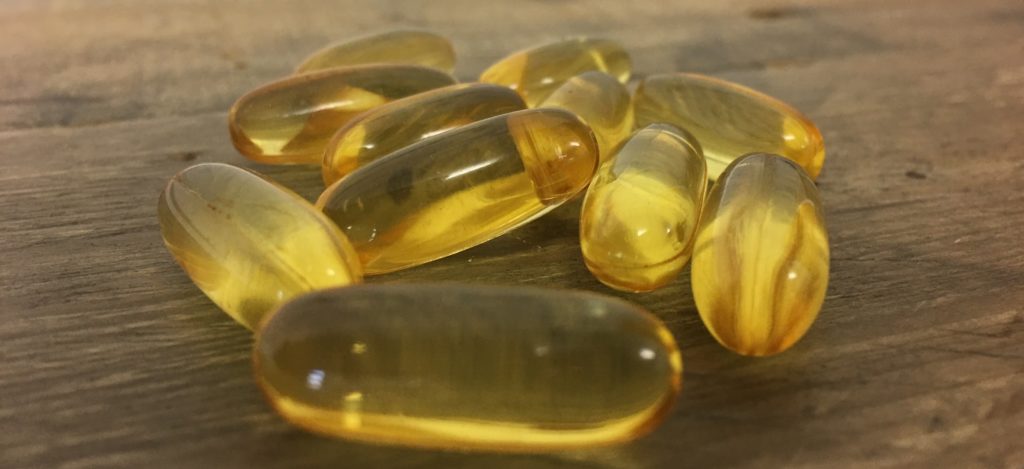Women's Health
Fish oil supplementation during pregnancy and lactation
DHA and EPA are omega-3 fatty acids that are essential for health and development during pregnancy. This is true for both mother and baby. Our bodies are not able to make these fatty acids so we have to obtain it through our diet1. The major dietary source of DHA/EPA is seafood, which is restricted to 2 servings/d during pregnancy due to environmental toxins, like mercury. Unfortunately, the typical American diet is very low in DHA. Even with the recommended 2 servings of seafood a week and using omega-3 rich vegetable oils, it is impossible for pregnant women to meet their omega-3 requirement of 600mg/d2. These two nutrients have complementary and individual benefits to you and your baby during pregnancy.
Benefits
DHA is critical for fetal neurodevelopment, especially during the third trimester. At this point, the baby accrues about 50-70mg/d of DHA, up through 18 months of life3. DHA is necessary for neural and retinal development and has been linked with
- decreased premature delivery,
- higher mental processing scores,
- increased birth weight,
- higher scores on eye and hand coordination, and
- higher scores on other tests of visual and mental acuity4,5.
One study showed that for those who did not eat seafood or use fish oil supplements, the rate of preterm delivery was 7.1%, compared with 1.9% in those who ate fish regularly. This is more than a 3-fold difference 6. Overall, DHA is essential for the development of the brain, eyes, and central nervous system1.
EPA specifically supports the heart, inflammatory response, and immune system1. Even before pregnancy, EPA has benefits as it has been shown to ease menstrual cramps7.
The Relationship between DHA & EPA
DHA and EPA work together synergistically. It is important to have both in the right balance for proper transport and uptake of DHA into the fetal cells8. EPA is also important as it supports immune function, the inflammatory response as well as the cardiovascular system, mentioned above.1 Together, they comprise an essential part of your pre and postnatal nutrition.
Breastfeeding
As mentioned, DHA is absolutely essential for proper brain development at least through 18 months of life. This means it is not only important to be taking DHA/EPA supplements through pregnancy, but also through lactation. You will be your baby’s only source of DHA/EPA as your baby cannot make them.
Often, women consider the benefits of fish oil DURING pregnancy but do not understand the risks of a lack of omega-3s AFTER birth. Up to 44% of women of who take fish oils during pregnancy no longer do so while breastfeeding9. It has even been suggested that low levels of omega-3s may be linked to increased postpartum depression9.
Your baby continues to develop beyond the womb. He/she will still require these essential fatty acids for proper and healthy development.
Quality Supplements
It is important to take high-quality fish oil during pregnancy to avoid environmental toxins.1 Typically, the manufacturing process rids the fish oil of the toxins. However, you still need to make sure you find a quality prenatal or fish oil supplement.
With a healthy diet, as well as proper omega-3 fatty acid supplementation, you will be able to provide the backbone of a healthy life for your baby.
Shop Forte Supplement Products
1- Omega-3 Fish Oil and Pregnancy: Benefits & Proper Dosage. American Pregnancy Association. http://americanpregnancy.org/pregnancy-health/omega-3-fish-oil/. Published January 2016. Accessed December 11, 2016.
2- Greenberg JA, Bell SJ, Ausdal WV. Omega-3 Fatty Acid Supplementation During Pregnancy. Reviews in Obstetrics and Gynecology. https://www.ncbi.nlm.nih.gov/pmc/articles/PMC2621042/. Published 2008.
3- Innis SM. Essential fatty acid transfer and fetal development. 2005;26:S70–S75. [PubMed]
4- Jacobson JL, Jacobson SW, Muckle G, et al. Beneficial effects of a polyunsaturated fatty acid on infant development: evidence from the Inuit of Arctic Quebec.J Pediatr. 2008;152:356–364. [PubMed]
5- Dunstan JA, Simmer K, Dixon G, et al. Cognitive assessment of children at age 2(1/2) years after maternal fish oil supplementation in pregnancy: a randomised controlled trial. Arch Dis Child Fetal Neonatal Ed. 2008;93:F45–F50. [PubMed]
6- Olsen SF, Secher NJ. Low consumption of seafood in early pregnancy as a risk factor for preterm delivery: prospective cohort study. 2002;324:447–450. [PMC free article] [PubMed]
7- Eicosapentaenoic acid (EPA). University of Maryland Medical Center. http://umm.edu/health/medical/altmed/supplement/eicosapentaenoic-acid-epa. Published March 23, 2015. Accessed December 11, 2016.
8- Larqué E, Krauss-Etschmann S, Campoy C, et al. Docosahexaenoic acid supply in pregnancy affects placental expression of fatty acid transport proteins.Am J Clin Nutr. 2006;84:853–861. [PubMed]
9- Marcela J. Study: Pregnant Women Aren’t Getting Enough Omega-3. Mercola.com. http://articles.mercola.com/sites/articles/archive/2015/04/27/omega-3-pregnant-women.aspx. Accessed December 11, 2016.


